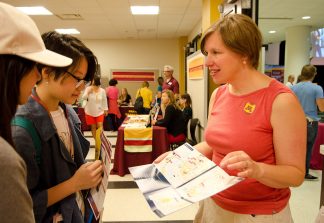By Allison Campbell-Jensen

“Egg timer in tomato shape for Pomodoro Technique” by Marco Verch is licensed under Attribution 2.0 Generic (CC BY 2.0)
Learners moving from high school homework to first-year course requirements at the U of M typically can benefit from advanced skills in research and studying. Developing these skills has long been a goal for Kate Peterson, Undergraduate Services Librarian.
This semester brought a new challenge, as the U closed much of campus to manage COVID-19 and moved to online or alternative instruction. Peterson says she and Jenny Steiner, coordinator of Student Academic Success Services, addressed an additional question: “How can we help all these students who are going through a crazy experiment they never signed up for?” Their answer is a one-hour workshop in Pomodoro study skills offered a few times this semester.
Scientifically informed study
The Pomodoro technique rests on science, says Steiner. Put simply: “Our brain can only take in so much.” Students bring a project to the workshop, then learn to apply their focus to working for 25 minutes, then take a break for 5 minutes. Not on the smartphone, however, where one can get lost and not notice time slipping away, but instead taking a stretch or a brief walkaround.
Timing one’s work provides a structure that may be helpful for students who are feeling stressed or anxious right now, Steiner says. Pomodoro can kick-start their study time and encourage them to accomplish their goals, one 25-minute segment at a time.
Learning to learn
Learning to Learn was a precursor workshop to Pomodoro that Peterson offered. It arose from conversations that she had with Amy Riegelman, Social Sciences Librarian, about meta-cognition.
“Meta-cognition is a fancy scholarly sort of term,” Peterson says, that means “being aware of and learning how one learns something.”
Peterson seeks to teach skills that help students move from being novice researchers — picking a problem, then immediately jumping into research without a clear plan — to more expert ones. These include taking time to assess a problem, analyzing possible approaches, developing a plan, and then tackling the research.
Time – and virtual space – to study
Jenny Steiner
In the past, Peterson also has offered students ideas about where to study because it may not be obvious for those new to the U that quiet study spaces can be found in the libraries — and that group-work areas exist, too. In our current #StayAtHome environment, Steiner says, a workshop like Pomodoro offers them a time to be together and be in solidarity with each other as they study — a virtual study hall.
The students who have taken the workshop this semester have been enthusiastic and positive about the experience, Steiner says. In a workshop earlier this semester, students brought work from math, chemistry, and language courses, as well as papers they need to write.
Pomodoro offerings
More workshops are being offered this term. Students can register online for Pomodoro on May 1 or on May 4.
There’s definitely a benefit, Peterson says; “a student can get that extra thing done and more efficiently.”
As for the Pomodoro name? Steiner says: “The person who created it used a timer that looked like a tomato.” With apologies to the Gershwin brothers: You say “tomato,” I say “Pomodoro,” and students say: “Let’s get this paper done.”




